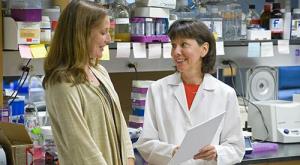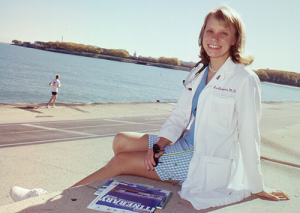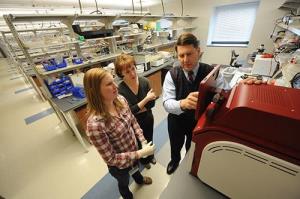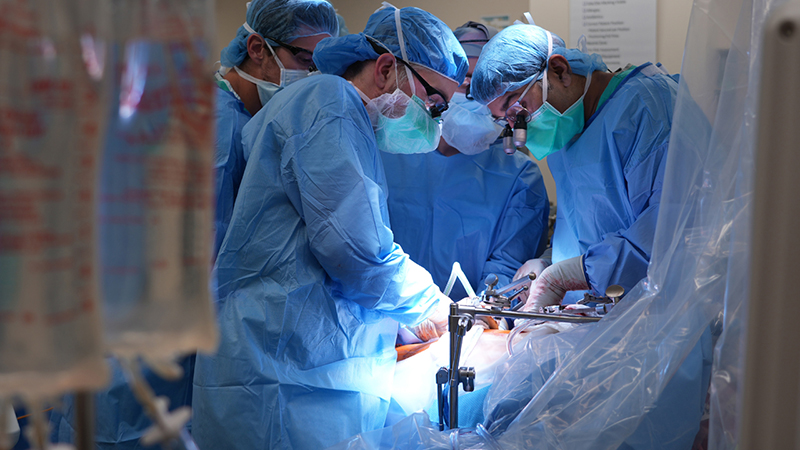The Scientists Behind Better Care
Meet 4 Feinberg Scientists Personalizing Health Care
How often do you think about the research behind your physician’s recommendations? From the most advanced treatments to at-home health tips, physicians benefit from the medical studies and constant innovations of research scientists. Moreover, many physicians are research scientists themselves.
At Northwestern Medicine, physicians have access to the studies and research capabilities of Northwestern University Feinberg School of Medicine. As such, the care Northwestern Medicine provides is continually informed by the work they and their peers conduct in both the exam room and the lab.
Meet four scientists and physicians and the research they’re conducting to revolutionize better patient-focused, personalized care.
These stories have been edited and adapted from feature profiles in Northwestern Medicine magazine.
Elizabeth McNally, MD, Personalizing Heart Care on a Genetic Level
 The use of genetic information to inform patient care, from cancer to neurological disorders, has personalized medicine for individual patients like never before. But more is still to come. Much more, if you ask Elizabeth M. McNally, MD, PhD, the director of the Center for Genetic Medicine at Northwestern University Feinberg School of Medicine.
The use of genetic information to inform patient care, from cancer to neurological disorders, has personalized medicine for individual patients like never before. But more is still to come. Much more, if you ask Elizabeth M. McNally, MD, PhD, the director of the Center for Genetic Medicine at Northwestern University Feinberg School of Medicine.
An internationally renowned expert on the genetics of heart disease and muscular dystrophy, Dr. Elizabeth McNally foresees an entirely new era for genetic medicine.
“A revolution in DNA sequencing is dramatically driving down costs and transforming how we practice medicine,” says Dr. McNally, who is also the Elizabeth J. Ward Chair of Genetic Medicine. “Now more than ever, we have the opportunity to expand our understanding of genetic variations and link this information to clinical outcomes so that we may more effectively care for our patients.”
At Northwestern Medicine, she directs a clinical cardiac genetics program through the Bluhm Cardiovascular Institute. A relatively new offering for Northwestern Medicine in the area of genomics and cardiovascular medicine, the program leverages genetic counseling and testing to identify individuals at risk for hereditary heart disease and to plan appropriate treatment from devices to drugs.
The growing field of personalized medicine relies on the ability to tap into DNA codes.
“In our clinic, we’ve already been doing personalized medicine to deliver more precise therapies, minimize side effects and improve outcomes,” she says. “Cardiovascular genetics has grown at an amazing rate and demonstrated the importance of using genetic information in the practice of good medicine in cardiology and across other areas of medicine as well.”
Learn more about Dr. McNally and her research in her Northwestern Medicine magazine feature story.
Maciej S. Lesniak, MD, Finding Biological Approaches for Brain Tumors
 When Maciej S. Lesniak, MD, saw his mother, an obstetrician and gynecologist, often rushing off at all hours to deliver babies, he never imagined he would become a physician himself. With a zeal for languages and culture, he thought he’d pursue a career in international law. But he came to realize the science and human interaction aspect of medicine appealed to him much more.
When Maciej S. Lesniak, MD, saw his mother, an obstetrician and gynecologist, often rushing off at all hours to deliver babies, he never imagined he would become a physician himself. With a zeal for languages and culture, he thought he’d pursue a career in international law. But he came to realize the science and human interaction aspect of medicine appealed to him much more.
Today, as a world-renowned neurosurgeon and brain cancer scientist, Dr. Maciej (Matt) Lesniak embraces the long hours of his profession because he loves what he does.
“I can’t imagine doing anything else in life,” says Dr. Lesniak, who is also the chair of the Department of Neurological Surgery at Northwestern University Feinberg School of Medicine where he investigates biological approaches to attacking malignant brain tumors and works to translate that research into clinical therapies for his patients.
Dr. Lesniak describes his research as broad because it encompasses four domains: stem cell biology, nanotechnology, gene therapy and immunotherapy – the four major areas where he believes many biologically based discoveries will be made. By no means meant to negate the importance of chemotherapy or radiation therapy, his interest has always been in developing biologically driven options with the FDA for use in clinical trials.
In addition to research, teaching and writing – among the other administrative aspects of his position – Dr. Lesniak maintains a robust neurosurgical practice.
“When people call with a brain tumor diagnosis, it is one of the scariest moments in their lives. My philosophy has always been that we are here to make this experience as easy as possible on them,” he says.
Learn more about Dr. Lesniak and his research in his Northwestern Medicine magazine feature story.
Lee Lindquist, MD, Studying the Elderly and the Last Quarter of Life
 Caring for seniors has always been a part of life for Lee Lindquist, MD. As a child, she helped care for her grandparents and many great uncles and great aunts
Caring for seniors has always been a part of life for Lee Lindquist, MD. As a child, she helped care for her grandparents and many great uncles and great aunts
“I love old people,” says Dr. Lee Lindquist, an associate professor of Medicine at Northwestern University Feinberg School of Medicine and a physician at Northwestern Memorial Hospital. “It’s a way of life, a mission. These are the people who have helped us before and it’s our turn to help them.”
That passion brought Dr. Lindquist to Northwestern University as a first-year medical student in 1996 and has kept her here for two decades. She has risen through the ranks to lead Geriatrics as section chief and become a nationally recognized scientist in geriatrics.
During her fellowship, she published a study that showed living on a cruise ship could be a cost-effective alternative to assisted living. The study quickly made international headlines and officials from other countries, including Mexico, Italy, Canada and Netherlands, reached out to her for help with their nation’s aging population.
Currently, Lindquist’s work focuses on keeping seniors at home. She and her colleagues have developed a website called Plan Your Lifespan to help seniors anticipate what they will need in order to stay in their homes as they age.
“It’s the best place for them,” Lindquist explains. However, many seniors living at home face frequent emergencies. “We’re seeing so many seniors and aging parents living on a cliff. They are doing okay right now at home, but at any minute they could fall off and have serious needs.”
Learn more about Dr. Lindquist and her research in her Northwestern Medicine magazine feature story.
Alfred L. George Jr., MD, Using Genetics to Guide Pharmacology
 When it comes to understanding what ails us, the study of how drugs work in living organisms makes pharmacology one of the most clinically relevant scientific disciplines. Alfred L. George Jr., MD, a renowned expert in the field of ion channel proteins and the Magerstadt professor and chair of Pharmacology at Northwestern University Feinberg School of Medicine leads that study as the director of the Center for Pharmacogenomics.
When it comes to understanding what ails us, the study of how drugs work in living organisms makes pharmacology one of the most clinically relevant scientific disciplines. Alfred L. George Jr., MD, a renowned expert in the field of ion channel proteins and the Magerstadt professor and chair of Pharmacology at Northwestern University Feinberg School of Medicine leads that study as the director of the Center for Pharmacogenomics.
Growing up, Dr. Alfred George’s father was a physician and while he had no plans to become a practicing physician, his familiarity with the field of medicine prompted him to enter medical school with the intention of conducting research.
Genetics dictate how patients will react to any given medication. A rapidly emerging area of study, pharmacogenomics strives to understand how genetic determinants affect drug responses (both good and bad). This, in turn, allows for patient care that is truly personalized. In the area of oncology, for example, clinicians have already been tailoring drug therapy to specific tumor types determined by genetic testing.
The creation of the Center for Pharmacogenomics expanded the discipline at Northwestern Medicine and an early emphasis of the center was and is to study ways to implement testing and interpretation in a clinical setting.
“One day, doctors will be able to test preemptively for genetic susceptibilities and know which medications will work best for their patients, whether they should back off on the dosage or change drugs entirely. There are great opportunities in the future to advance personalized medicine with pharmacogenomics,” says George.
Learn more about Dr. George and his research in his Northwestern Medicine magazine feature story.





